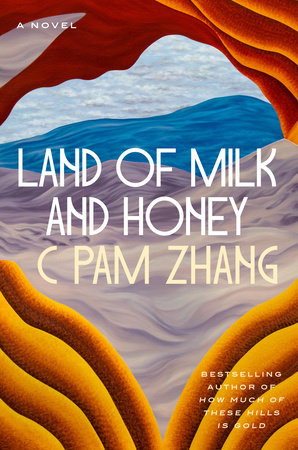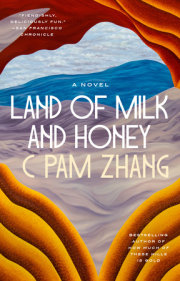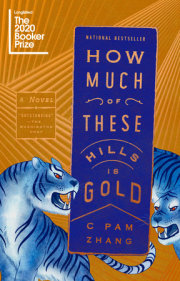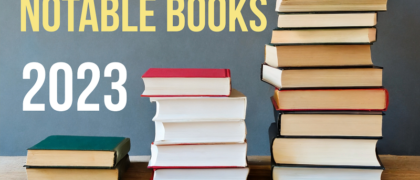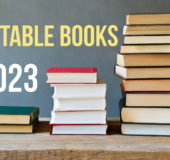One I fled to that country because I would have gone anywhere, done anything, for one last taste of green sharp enough to pierce the caul of my life. I was twenty-nine, a hungry ghost, adrift. I hadn't seen California in ten years, hadn't tasted a strawberry or a leaf of lettuce in three. Hunger was simple, as the rest was not.
Here is the rest: I was an American stranded in England when America's borders closed; I was a cook as that profession lay dying. Both troubles shared one source, namely the smog that spread from a cornfield in Iowa and soon occluded the sun, smothering as it went fields of wheat in Canada and paddies of hard yellow rice in Peru. No more lemon trees fragrant on the slopes of Greece, no more small sweet Indian mangos. Biodiversity fell. Wildlife and livestock perished for lack of feed. Scientists bickered over the smog's composition and politicians over whether pollution or lax carbon taxes or China or nuclear testing or America or Russia were to blame, and all the while the darkness, slightly acidic, ate its way through fertile fields. America plunged into famine while my career hung suspended by the sea—the wrong sea, the oily, inhospitable Atlantic. Each morning I walked to the American consulate to hear the answer,
Soon. Each afternoon I thawed frozen fish at the restaurant that underwrote my refugee visa. My life was dredge, fry, plate. My life was wait, wait, wait.
The day the letter arrived from California was the day the chef announced pesto cut from the menu for good. No more nuts and seeds in the pantry, and no basil, not even the powdered kind. I barely heard. I slipped my envelope into the walk-in freezer, as if ice might cool desire.
With my back against chilled steel, I extracted not an American reentry permit but a bill. The attached letter informed me that my dead mother's apartment in Los Angeles had burned down.
Regrettable accident, the lawyer wrote of the riot that caused it, and then,
legally liable. Cataloged in exhaustive detail were waste disposal fees and firefighting fees and city emissions fines, but nowhere did the bill mention the color of the apartment walls, which I could no longer recall. No avocados, no strawberries, no almonds. California had become a food desert and I imagined wind howling through broken windows, scouring, dry, unclean.
The door opened as I was doing the math.
Chef says break's over, a line cook told me.
He wants you to make a sub for the pesto.
With what? The cook kicked a bag of flour on his way out.
Anything you want, princess, so long as you use this shit. The flour puffed in a fine gray cloud. No parsley, no sage, no produce of any sort. It was spring. March. But a false spring in which crops would fail for the third year running. Blame the smog's acidic nature, as some did; blame the same anhydrites that doomed the dinosaurs, or a lack of sun and morality; what it amounted to was skies that were gray and kitchens that were gray, you could taste it, gray. No olives, no quails, no grapes of the tart green kind for Champagne. I took stock of the restaurant's dwindling supplies: dusty tins, icy slabs of years-old fish. Mostly it was bag after bag of the mung-protein-soy-algal flour distributed by the government.
We were lucky to have it! they said. The flour was a miracle of nutritional science, engineered from plants that tolerated dark. Lucky the smog had taken a year and a half to reach Europe, lucky to escape the famine that ravaged the Americas and Southeast Asia, lucky that mung-protein flour was calorie for calorie cheaper than the cobbled-together diets of old. Yet the flour was gritty and gray, and the bread it baked could not be coaxed to rise. I am speaking of an occlusion in my twenty-ninth year, a dimming of how far I could see in front of me; I am speaking not only of the air.
Chef had lost its meaning, like
lucky, like
fresh, like
soon. No saffron, no buffalo meat, no polished short-grain rice. Dishes winked out from menus like extinguished stars as a conservative, nativist attitude seized the few restaurants that remained open thanks to government subsidies. As they shut borders to refugees, so countries shut their palates to all but those cuisines deemed essential. In England, the shrinking supplies of frozen fish were reserved for kippers, or gray renditions of cod and chips—and, of course, a few atrociously expensive French preparations with which a diner might buy, along with sour wine, the illusion that she still lived in luxury. Back to stodgy safety. Back to national dishes unchanged for hundreds of years. The loss of pesto should have come as no surprise in a world with no favas, no milkfish, no Curry Lane in London or Thai Town in LA, no fusion, no specials of the day, no truffles turned out like sheepish lovers from under their blankets of sod. We were lucky, those around me said. We survived.
But in the dimness of that refrigerated room I could no longer see a future for the halibut dish without pesto, as I could not fathom the depth of my debt, or the tint of cloudless sky. Couldn't see what it was for which I survived. I was alien to the Brits with their stiff upper lips; if I had a friend in that dank port town, it was the drunk who haunted the half-empty supermarket, proclaiming the end of everything.
That day, I knew. A world was gone. Goodbye to all that, to the person I'd been, to she who'd abandoned, half-eaten, a plate of carnitas under blaze of California sun. It wasn't grease I missed so much as the revelation of lime. Waiting on grief, I met hunger. For radish, radicchio, the bitter green of endive.
**
And so I quit that job to pursue recklessly, immorally, desperately, the only one that gave me hope of lettuce. The position was private chef for what advertised itself as an
elite research community on a minor mountain at the Italian-French border. A quick search turned up that controversy. The community’s objective was to bioengineer food crops capable of withstanding smog, all discoveries to be shared with the Italian government—but because funding came from private investors, to strike the deal parliament had ceded one of the rare high-elevation zones still blessed by occasional sunlight. And so the mountain was populated by investors and their attendant scientists, staff, medics, field hands, et cetera who enjoyed carte blanche when it came to how they met their lofty research goals. Apart from quarterly check-ins by the Italian ministry of agriculture, there were no monitors, no police presence, no communications out or in: the mountain governed itself with diplomatic immunity. The howling online was thunderous.
A beast who is fat may buy his own country!! I read in one of the auto-translated comments, which confused me until I looked up an alternate translation:
Rich monster. All that mattered to me was the job's promise of fresh produce, but—here was the catch—no guarantee of a long-term visa. It was a ten-week contract-to-hire. At-will employment, at my employer's will.
Colleagues at the seafood restaurant inquired after my sanity when I resigned. They reminded me of the thousands begging for my work visa.
I wasn't unaware of the risk. It was for this reason that I supplemented my application with lies. The job called for a formally educated, French-trained chef capable of
working with unusual ingredients and
turning out exquisite haute cuisine, and so I hammed up my experience. Education at Le Cordon Bleu in Paris, sous chef at a Michelin-starred restaurant that closed when its owner was found hanged from a string of her own saucissons—no one to refute my claim. If I hesitated at my lies, or at the extreme isolation the community demanded (nondisclosure agreement, no phone, no internet, no contact, no family, no leaving restaurant grounds without permission)—if I hesitated at my younger self's declaration that everyone would taste my food, that cooking was an art neither frivolous nor selfish—well. I was no longer she who'd left California with scruples and ambition; as I did not know who I was, exactly, I molded myself to the application's shape.
Only at the end of the form did I concede to honesty.
I am your perfect candidate, I wrote in the open text field,
because I have nowhere on earth to return to. I will faithfully perform any task within reason, and with dignity. Possibly this was insane. It's true that my sole confidant before leaving England was the supermarket drunk.
You understand, I whispered,
I have to do this. His breath, as he kissed my palm, had the antiseptic coolness of mung-protein flour. Shoppers gave us wide berth. They lied to themselves, as scientists lied, as politicians lied, as my employer with his opacity and his dubious wealth must have lied, too. I only cared that he provide a head of shriveled lettuce; even iceberg would do. That was my wish. That was my fantasy.
**
I first began to sense something beyond the dusty rim of the plate I called my life when I received my acceptance. There was no further clarification of my duties. Just one sheet of thick, expensive paper that gave off a hint of citrus, plus a scent I couldn’t name, grassy and sweet. On the front was the location where I’d be picked up by private jet. On the back, a handwritten note.
I, too, am a dignified man, my employer wrote, a fact you will see for yourself. And so I crossed into the land of milk and honey knowing nothing, not even the country's true name. It was the officer at the Italian border who first said,
Terra di latte e miele? It was three in the morning. I'd flown through the night and could not quite see where I'd landed, nor my interrogator's face. The hatred in his voice was so intimate that I wondered if I knew him.
No thanks, I don't want coffee, I said, latching to the one word I thought I understood. I understood nothing, my god.
I hadn't encountered that odd, archaic phrase before my arrival; I wasn't meant to. They hid the country's true name as they hid its true nature. After Italian immigration, it was the mountain's private security that held me for hours, taking my passport, my retina scans, the measurements of my face and waist and earlobes, my blood, my phone, my photo. This last made the guard pause for so long that I grew nervous. The picture I'd sent in my application was slightly blurred, taken from a distance, my features indistinct. As if, should I be discovered, I might plausibly deny being myself.
The guard touched her throat. --- -- ------ -, she said, and let me pass.
It was in the small hours of morning that I drove up the mountain in a discreet black car. The wind nipped, hard, and though the air up high was smogless, it was cheerless, too. Rocks scrawled gloomy warnings in the dark. Occasionally a compound would loom, then vanish, in a flash of high, cold wall that seemed intent on excluding me—an impression that proved correct, because never would I be invited into the homes and private lives of those investors. The piece of mountain I claim is heat and toil, soft flesh and the hard taste of salt.
What fields I passed were sere and dead. No sign of spring, for all my employer's grandiose goals. I'd pared my expectations down to dried herbs by the time I reached the mountain's peak.
**
The restaurant at the top appeared as a hulking box the same dark hue as the sky it rose against. No windows broke the monotony of those walls. A cliff behind dropped into abyss and the front lawn, while vast, was muddy. I found the lights off, no answer at the locked door. I stood shivering and perplexed as the sky lightened.
The door clicked open at last. I stepped through just as sun rose over the mountain.
Much later it would occur to me that he had timed this moment, my employer with his flair for the dramatic, a man who named his country with a prophet's arrogance. The light was stunning, transcendent, a white-hot bullet between the eyes. From behind my fingers I saw dark walls blush lavender, orange, pink. The restaurant was built of two-way glass, opaque from without and transparent from within, so that on my first morning I had the impression of no walls, no windows, no doors, just the suspension of my body in sky, sky, sky, sky, sky. I had traveled, it seemed, through those low, smoggy years to emerge in this vessel of light.
I would come to know the restaurant in its many moods. Blue by day, apricot at sunset, bruised by the advent of night or storm. The view never ceased to awe. All the rest of my time I'd experience headaches, mild vertigo, a kind of drunkenness on the light that gilded the dining rooms, and pooled in the bed in the suite labeled EMPLOYEES ONLY, and made a blaze of the chef's coats I found in the closet, along with a white silk dress, floor-length, some housekeeper's mistake.
The kitchen was the room most loved by light. Sun streamed down and made the white appliances one continuous pour of milk. I wanted to lick it; I settled for touch. I strummed the marble counters and turned dials on the twelve-range stove, and when I ran a hand over the backsplash I discovered under my fingers ivory suede, an insane material, impossible to keep clean, but so plush it held my imprint. As I stood at the window counting the Tiffany fish knives, I felt a euphoria such as the first European colonizers must have upon sighting new land.
Mine, I thought, and it wasn't for a while that I realized the kitchen was empty of food.
On my second pass, I spotted a box behind the door.
Impress me, this note said. Inside were flour, vanilla, eggs.
I'd expected a test, of course: a textbook omelet, or a flawless consommé to prove the French training the job demanded. Pastry, no. Giddiness abandoned me as I unpacked baking soda, sugar, milk. Even the voluptuousness of the butter couldn't distract from thoughts of my spotty experience in pâtisserie, and the precarity of my visa, and what would happen were I turned away—and then I was no longer thinking because at the bottom of the box I touched something as warm as skin, as yielding as a woman's inner thigh: strawberries.
Amen, I heard myself say, wet-mouthed. I was surprised my breath didn’t smudge the air. Red: that color of desire. I began again and said the whole prayer,
Our Father through
daily bread. Not my words. They belonged to a pastry chef I’d loved, a lapsed Catholic who rediscovered his faith each morning as he fingered the day’s shipment of fruit, and forgot it anew each afternoon as we fucked among the butterand jam. He was the first to take seriously my appetites, my ambitions. He never stored a strawberry cold. Close to the stem, he said, closest to the earth, their perfume is complex, not sugar: closer to flesh, the flesh of a loved one, not sanitized, not anodyne, but full of many waters. Strawberries and spring, strawberries and musk, strawberries and sex flooded back as I crushed my tongue to sugar. I’d come to that countryhardly daring for bitter green and here, now, this rupturing sweetness. I couldn’t remember what hour it was, how many time zones I’d crossed, when I’d last eaten. For years I’d fed, survived, swallowed my portions of gray—but had I hungered for pleasure?
Copyright © 2023 by C Pam Zhang. All rights reserved. No part of this excerpt may be reproduced or reprinted without permission in writing from the publisher.




